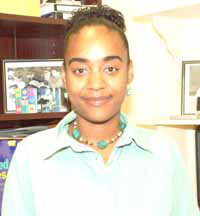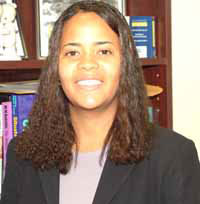Minority Postdoctoral Fellows
This year's Minority Postdoctoral Fellows hail from both coasts of the U.S. Belkis Suazo-Garcia is a sociologist and Ph.D. graduate from the Graduate Center of the City University of New York who grew up in the Bronx and attended a boarding school in Wellesley, Massachusetts. Maisha Fisher, comes to TC from University of California at Berkeley, where she received her Ph.D. in Education: Language, Literacy and Culture.
Belkis Suazo-Garcia focused her dissertation on black and white young adults transitioning from high school to postsecondary education. She became interested in the fact that more women and fewer men were reportedly attending college. "I wanted to see if these patterns were actually as strong as the popular press reported them, and to see if the male under-enrollment was consistent across racial groups," she said.
While she found that black and white males had the same pattern of academic preparation for four-year institutions, black males were at a greater disadvantage in their academic preparation. "I also found that for black males, it was very important for them to receive strong support from their families and schools. Even if they were to raise their academic achievement to those comparable to black females, that wouldn't be enough without nurturing and sponsorship to direct them to higher education," Suazo-Garcia said.
Another important finding in her dissertation study was that there was a lack of evidence of disengagement among black males-that they tend to misbehave in school, were tied to peers who are not academically engaged or did not feel that education was a worthy goal. Under-enrollment in higher education was more about academic preparation and support.
She also found a gap among those who could attend two-year institutions. "I found that for black males who could go to a community college, their primary reason for not enrolling was their desire to pursue other career paths that may or may not be tied to postsecondary education, such as joining the military."
While at TC, Suazo-Garcia will be working on two projects with similar goals. She will begin to look at data from the Department of Education to investigate the institutional features of universities that students attend and their background prior to entering higher education. She hopes to determine how these two factors play a role in college success.
Her second project will be through the National Center for Young Children and Families, where she will focus on the black-white achievement gap of young students and how these students develop the academic preparation given to them during their early years of schooling. She sees both projects as interconnected. "I want to see where their prior academic and social experiences take them after they complete high school," she explained.
During her tenure as a Postdoctoral Fellow, Suazo-Garcia will teach a Research Methods Course in the spring that will focus on longitudinal data analysis.
In addition to her research on academic patterns and transitions, Suazo-Garcia has looked at the racial and ethnic digital divide in computer ownership, and a paper on which she was a co-author entitled, "Computers and Young Children: Social Benefit or Social Problem?" will appear in Social Forces.
Suazo-Garcia also received a Minority Access and Graduate Network (MAGNET) dissertation fellowship while working on her dissertation.
Maisha Fisher's dissertation at UC-Berkeley was based on an ethnographic study on teaching and learning spaces in non-school settings for spoken word poetry events as well as two black-owned and operated book stores. "I looked at the way people created practices around literacy and also interviewed participants-owners of the venues, organizers of the event, poets and writers and audience participants-to find out what their motivation was for participating in these activities," she explained. "I'm really interested in people making choices about their learning and what types of choices they make, particularly when it is in an out-of-school setting."
Her study, titled "Choosing Literacy: African Diaspora Participatory Literacy Communities," took into account the diversity within blackness as well as exploring continuities among people of African descent.
Participants ranged in age from 16 to 60, with young poets serving as inspiration and being mentored by some who considered themselves "elders." "The word ‘continuum' kept coming up in the interviews and this idea of young people being able to locate themselves in a continuum of writers and a continuum of people who share in a legacy of literacy," Fisher noted.
An article about her work, "Open Mics and Open Minds: Spoken Word Poetry in African Diaspora Participatory Literacy Communities," is in the Harvard Educational Review's special issue on popular culture for fall 2003.
Fisher has taught elementary school and high school in Sacramento City Unified School District. Additionally, Fisher supervised student teachers in the Multicultural Urban Secondary Education (MUSE) program at UC Berkeley.
While at TC, Fisher will be working with two teachers in the New York City public schools who have organized spoken word poetry writing workshops with their students. In the spring, she will teach a class at TC titled, "Reclaiming Literacy Through Ethnography," based on her dissertation research.
"I am also preparing a couple of manuscripts to be published and I am presenting at NCTE (the National Council of Teachers of English) in November," Fisher added.
Published Monday, Dec. 1, 2003

